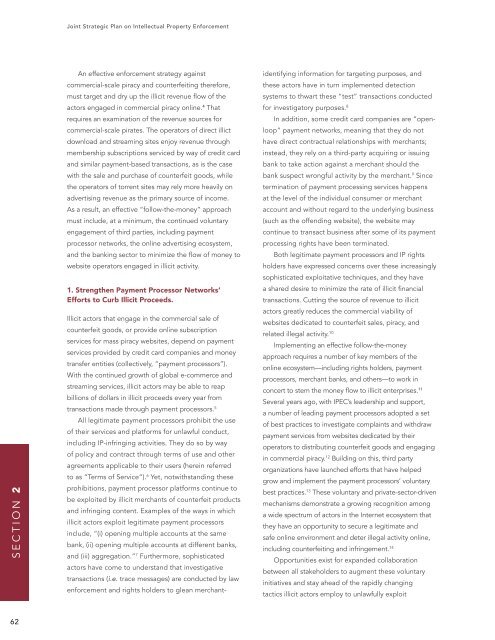ENFORCEMENT
eop_ipec_jointstrategicplan_hi-res
eop_ipec_jointstrategicplan_hi-res
You also want an ePaper? Increase the reach of your titles
YUMPU automatically turns print PDFs into web optimized ePapers that Google loves.
Joint Strategic Plan on Intellectual Property Enforcement<br />
SECTION 2<br />
An effective enforcement strategy against<br />
commercial-scale piracy and counterfeiting therefore,<br />
must target and dry up the illicit revenue flow of the<br />
actors engaged in commercial piracy online. 4 That<br />
requires an examination of the revenue sources for<br />
commercial-scale pirates. The operators of direct illict<br />
download and streaming sites enjoy revenue through<br />
membership subscriptions serviced by way of credit card<br />
and similar payment-based transactions, as is the case<br />
with the sale and purchase of counterfeit goods, while<br />
the operators of torrent sites may rely more heavily on<br />
advertising revenue as the primary source of income.<br />
As a result, an effective “follow-the-money” approach<br />
must include, at a minimum, the continued voluntary<br />
engagement of third parties, including payment<br />
processor networks, the online advertising ecosystem,<br />
and the banking sector to minimize the flow of money to<br />
website operators engaged in illicit activity.<br />
1. Strengthen Payment Processor Networks’<br />
Efforts to Curb Illicit Proceeds.<br />
Illicit actors that engage in the commercial sale of<br />
counterfeit goods, or provide online subscription<br />
services for mass piracy websites, depend on payment<br />
services provided by credit card companies and money<br />
transfer entities (collectively, “payment processors”).<br />
With the continued growth of global e-commerce and<br />
streaming services, illicit actors may be able to reap<br />
billions of dollars in illicit proceeds every year from<br />
transactions made through payment processors. 5<br />
All legitimate payment processors prohibit the use<br />
of their services and platforms for unlawful conduct,<br />
including IP-infringing activities. They do so by way<br />
of policy and contract through terms of use and other<br />
agreements applicable to their users (herein referred<br />
to as “Terms of Service”). 6 Yet, notwithstanding these<br />
prohibitions, payment processor platforms continue to<br />
be exploited by illicit merchants of counterfeit products<br />
and infringing content. Examples of the ways in which<br />
illicit actors exploit legitimate payment processors<br />
include, “(i) opening multiple accounts at the same<br />
bank, (ii) opening multiple accounts at different banks,<br />
and (iii) aggregation.” 7 Furthermore, sophisticated<br />
actors have come to understand that investigative<br />
transactions (i.e. trace messages) are conducted by law<br />
enforcement and rights holders to glean merchantidentifying<br />
information for targeting purposes, and<br />
these actors have in turn implemented detection<br />
systems to thwart these “test” transactions conducted<br />
for investigatory purposes. 8<br />
In addition, some credit card companies are “openloop”<br />
payment networks, meaning that they do not<br />
have direct contractual relationships with merchants;<br />
instead, they rely on a third-party acquiring or issuing<br />
bank to take action against a merchant should the<br />
bank suspect wrongful activity by the merchant. 9 Since<br />
termination of payment processing services happens<br />
at the level of the individual consumer or merchant<br />
account and without regard to the underlying business<br />
(such as the offending website), the website may<br />
continue to transact business after some of its payment<br />
processing rights have been terminated.<br />
Both legitimate payment processors and IP rights<br />
holders have expressed concerns over these increasingly<br />
sophisticated exploitative techniques, and they have<br />
a shared desire to minimize the rate of illicit financial<br />
transactions. Cutting the source of revenue to illicit<br />
actors greatly reduces the commercial viability of<br />
websites dedicated to counterfeit sales, piracy, and<br />
related illegal activity. 10<br />
Implementing an effective follow-the-money<br />
approach requires a number of key members of the<br />
online ecosystem—including rights holders, payment<br />
processors, merchant banks, and others—to work in<br />
concert to stem the money flow to illicit enterprises. 11<br />
Several years ago, with IPEC’s leadership and support,<br />
a number of leading payment processors adopted a set<br />
of best practices to investigate complaints and withdraw<br />
payment services from websites dedicated by their<br />
operators to distributing counterfeit goods and engaging<br />
in commercial piracy. 12 Building on this, third party<br />
organizations have launched efforts that have helped<br />
grow and implement the payment processors’ voluntary<br />
best practices. 13 These voluntary and private-sector-driven<br />
mechanisms demonstrate a growing recognition among<br />
a wide spectrum of actors in the Internet ecosystem that<br />
they have an opportunity to secure a legitimate and<br />
safe online environment and deter illegal activity online,<br />
including counterfeiting and infringement. 14<br />
Opportunities exist for expanded collaboration<br />
between all stakeholders to augment these voluntary<br />
initiatives and stay ahead of the rapidly changing<br />
tactics illicit actors employ to unlawfully exploit<br />
62


